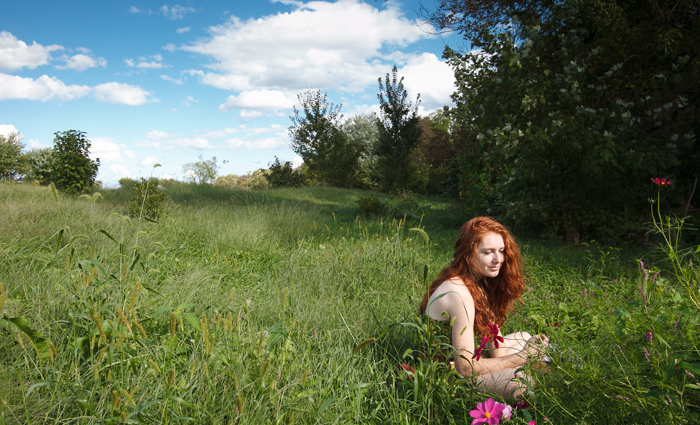Dishing Dirt in Class

Liberal arts goes al fresco at the College Farm
by MaryAlice Bitts-Jackson
September 20, 2013
Students in Associate Professor of Anthropology Karen Weinstein’s Anthropology of Food class do more than just read about and discuss what it takes to produce a crop of organic vegetables. They experience it, fingers in the soil.
Weinstein's students are among the many this semester who travel to the College Farm to augment what they’re learning in class. Throughout the year, students collect samples and data and perform experiments; take advantage of the farm’s idyllic surroundings for a change-of-pace lesson; and and get a close-of view of organic farming, sustainable energy or food production by digging in the dirt.
Digging in
Students in Weinstein's food-anthropology class will devote three hours this semester to weeding, planting or harvesting at the farm. “Many of them don't have a clear understanding of all that it takes to bring food from the farm onto their plates, and this brings that lesson home,” Weinstein explains. “It’s one thing to read about the local-food movement and the investment we must make to make our food system more just, healthy and sustainable, but it’s a very different thing to go out and weed crops for an afternoon.”
Assistant Professor of Anthropology & Archaeology Maria Bruno will take her students to the farm for a uniquely hands-on lesson on the production and politics of quinoa. As part of a food-anthropology and prehistory class, the students will tend a quinoa crop planted last spring by students in a history class, led by Assistant Professor Emily Pawley, that examined the history of food and environmental issues.
Students taking Associate Professor of Religion Dan Cozort’s Buddhism and the Environment course enjoy occasional al fresco classes that enhance their studies of the Buddhist concept of interdependence. During their Sept. 13 trip to the farm—the first of three class trips they’ll make this semester—the students practiced mindfulness in a peaceful setting and gained new perspectives on humans' connections to nature.
The virtue of quietness
After a brief talk by College Farm Director Jenn Halpin about farming and mindfulness, Cozort invited the students to explore the grounds in quiet contemplation.
Biology major Sam Mandl ’14 had visited the farm several times with science and environmental-science classes, but said his trip with Cozort’s religion class was unique. “We do meditation before this class so we can get into the right frame of mind, but coming to this environment adds something new to that experience. It worked well."
“It’s a nice change of pace, because we don’t usually take the time to just be by ourselves—to think and observe, like people did hundreds and thousands of years ago,” added Luca May ’14, an IB&M and economics major. “This class has really allowed me to think differently about the environment, and coming out here reinforces that.”
Halpin was quick to note that while the farm adds new dimensions to students' coursework, the students contribute to the life of the farm. “Seven generations of students have come through here and have been part of shaping it,” she told Cozort’s class. “It’s really cool to think of how many more will come through here and leave their mark.”
Published October 4, 2013